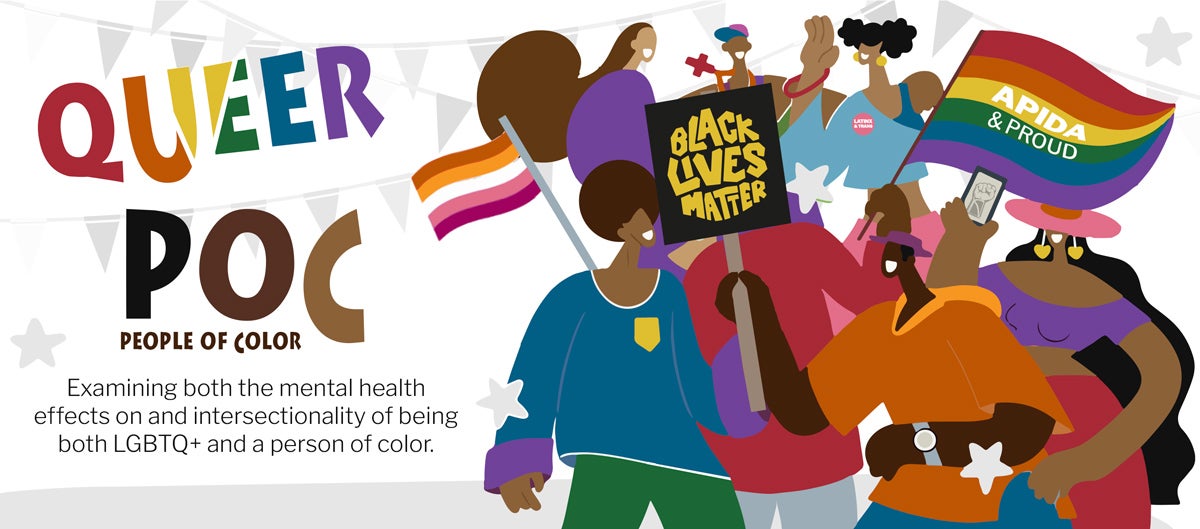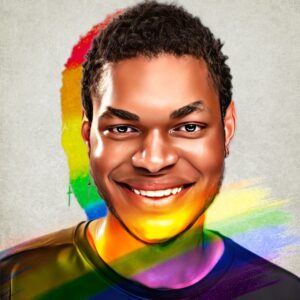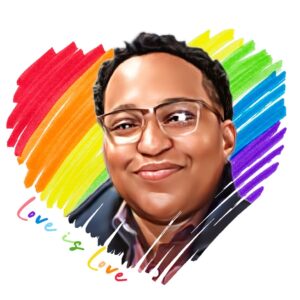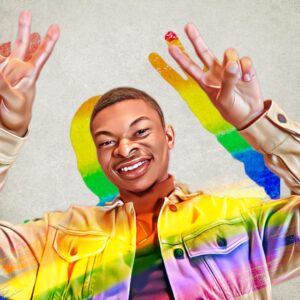
As stated in the Power of Being Out, we understand too well that the health and well-being of LGBTQ+/queer individuals must be a priority. The intersection of being queer with being a person of color (POC) exposes a person to unique stressors and threats to well-being. You met four LGBTQ+ people of color last week in part one. In part two, we meet three more individuals about how they have also pioneered unique forms of resilience and community.
G.E. Loveless
 G.E. Loveless is a full-time manager of youth programs at a non-profit organization and a branding project management consultant in Austin, Texas. As a , gender-fluid, Black/Afro-Caribbean, American, being out has “changed my life by allowing those around me not to define the work I do or the identity I choose to live by. Being out as my true self changed my well-being holistically (emotional, mental, spiritual) because I was challenged to self-reflect and unpack, forgive myself, and strengthen my roots with my religious and spiritual beliefs.” He also ”learn[ed] about love and how to let go of those who do not ‘see’ you or what it means in someone’s actions or vocabulary if they accept you or tolerate you. Being my true self, I became aware and am still healing, but learning as well.”
G.E. Loveless is a full-time manager of youth programs at a non-profit organization and a branding project management consultant in Austin, Texas. As a , gender-fluid, Black/Afro-Caribbean, American, being out has “changed my life by allowing those around me not to define the work I do or the identity I choose to live by. Being out as my true self changed my well-being holistically (emotional, mental, spiritual) because I was challenged to self-reflect and unpack, forgive myself, and strengthen my roots with my religious and spiritual beliefs.” He also ”learn[ed] about love and how to let go of those who do not ‘see’ you or what it means in someone’s actions or vocabulary if they accept you or tolerate you. Being my true self, I became aware and am still healing, but learning as well.”
We asked G.E. how being Black/Afro-Caribbean has affected his connection to the LGBTQ+ community. He stated, “As a Black boy, growing up I had fun experiences to learn about my Afro-Caribbean ancestry and live in a household where gender didn’t restrict you to the toys you were given or hobbies you enjoyed. However, in this development of being a conscious Black man I was not taught what it meant to be a queer Black man.” He continued, “I am challenged to reflect on beliefs and how I show up to advocate for my religious, Black, and LGBTQIA+ rights as well as for my peers. As an American I am challenged to deconstruct and unlearn biases and prejudices because American schools never taught me about my history as a Black man or queer man, so the idea of diversity and inclusion was never a learned behavior or skill for me.”
How has G.E.’s unique intersectionality shaped his mental health? “[It has] shaped my mental health by giving me communities within both the BIPOC and LGBTQIA+ spaces to seek help, have my voice heard, or meet and lean on a peer that happens to host yoga sessions every Sunday. Opening the door and allowing myself to be G.E. has led me to ask more questions, try more activities that act as my self-care, and to grow my network to be a resource for someone seeking community like me.”
For G.E., being out “has empowered me to take risks in investing, traveling to cities, and expanding my network as well as dedicate myself to supporting more projects in my community that affect people like me or my peers.”
And what does G.E. say are the three things he loves about himself and his truth? “I love my smile, the creativity in my complex brain and my long legs; as for my truth, I love its radiance as others can feel its energy and vibe. It is something about being yourself that is freeing in a sense of being able to speak without being silenced or to be seen without being judged but welcomed.”
Finally, we asked G.E. to leave a few insights. He replied, “Living your truth is a challenge and it is a struggle to find your community, to find the space where your voice is uplifted, and to obtain the support that works best for you. However, in this journey you will find balance, create boundaries, and win peace in the process. Living your truth, in your identity all starts with a ‘I am,’ to ‘I allow myself to,’ and ends with ‘What brought me peace today/this week was.’ Create those affirmations and begin living your truth through your vocabulary and it will translate to action. Simply, my insight is to disrupt the status quo daily, no victory is too small.”
Dakota Weathersby
 Dakota is a Black lesbian. When she is not working as a territory sales manager, or spending time with her wife and children, she works as a social media influencer known as “DK” and “The Moderator Creator” from Stud~ish Radio.
Dakota is a Black lesbian. When she is not working as a territory sales manager, or spending time with her wife and children, she works as a social media influencer known as “DK” and “The Moderator Creator” from Stud~ish Radio.
Dakota, a Christian, was raised by her grandparents and says “I am an African American, lesbian, female. I am no stranger to discrimination on either front; however, I am no friend to hate. Just because others would want to see me oppressed and enslaved to society’s closet, it doesn’t mean I will feel the need to do the same. The ease of knowing who I was and being strong enough to walk this journey alone gave me the mental toughness needed to survive the lows I encountered. To know upfront that the road will not be easy because of who you are gives you the readiness and preparation for what is to come when most may not realize that outside their door discrimination is real. Jealousy is real. Evil is real. Rather than my ‘three strikes’ being known as an affliction, I look more at it as a guide to my reality.”
When asked how her race has affected her queer identity, she says, “Being born Black prepared me for so many things. When society tried to fit me into a box to choose my identities, I was able to withstand the pressure because of my ancestors. We were taught our walk of life will come with ignorance but just don’t entertain it. We cannot compare scars nor judge each other, but we most definitely can’t allow ourselves to become insensitive toward each other’s plight.”
If we could just stop and truly listen to others in our community, we can get to a better place as a whole, rather than just worrying about yourself.”
Corey Alan
 Corey is a co-founder of Elevate Your Essence; strategic alliances director, community and youth engagement assistant at Out Youth; and professional child caretaker. They enjoy learning how to create safe spaces for their friends, while simultaneously healing their inner child. When they are not working you can catch them out exploring eateries and lounges around the Houston metropolitan area.
Corey is a co-founder of Elevate Your Essence; strategic alliances director, community and youth engagement assistant at Out Youth; and professional child caretaker. They enjoy learning how to create safe spaces for their friends, while simultaneously healing their inner child. When they are not working you can catch them out exploring eateries and lounges around the Houston metropolitan area.
For Corey, “Coming out as a Black. gay, and queer man has been extremely liberating and complex all at once. I would say it changed my mental health and well-being for the better, although I’m still learning to unpack the stereotypes associated with my sexuality and gender identity. I do believe with the proper resources and actively doing the work one day I will live in perfect harmony with myself, and others connected to me. “
And how do they feel about their identity within the Black community? “Whew, personally it was kind of difficult feeling accepted by cis-gendered individuals, being that I am originally from Memphis, Tennessee. Thanks to my best friend for helping me to realize everyone has an audience and I just had to find mine.”
As a Black man, how has that affected you within the queer community? “It has affected how I show up as myself in other spaces where POC are not as present.” Your unique intersectionality and mental health? “My unique intersectionality has made it a little challenging to show up in the world in ways that are most effective in achieving my version of success. I would best describe it as a toddler learning to walk.”
In your dealings with the world around you, how has being out and a POC empowered you? “It has empowered me to live more unapologetically in hopes of inspiring others to not conform to anyone’s idea of who they think they should be or how they should navigate through this world.” Affected you negatively? “Sometimes I’ve found it harder to establish business relationships with cis-gendered men due to their lack of acceptance or just pure ignorance.”
In thinking of their younger self, they would tell them, “You’re allowed to take time to curate the person you envision yourself being without feeling guilty.” And “Figure out your version of success and thrive in your truth. No one is allowed to invalidate you without your permission.” He wrapped up our talk with, “Take up space unapologetically. You’re not responsible for making others feel comfortable. There’s an audience waiting for the unique individuality you possess, and it deserves to be seen and heard. You’re worthy of being loved, accepted, and understood! Learn to love yourself before you try to give love to anyone else.”
From everyone at the Hogg Foundation, we would like to thank our contributors for being so honest and open about the power they find in being out as LGBTQ+ and a person of color.
